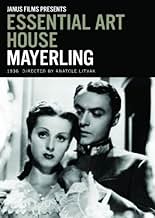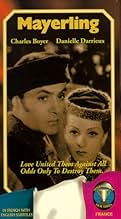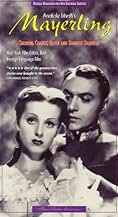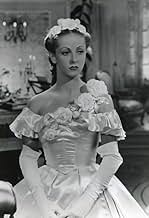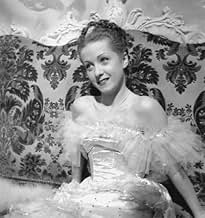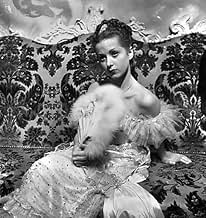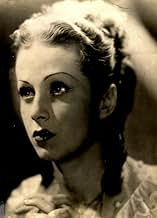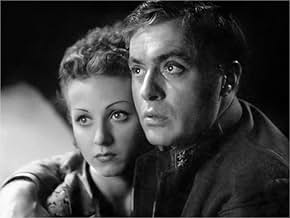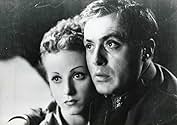L'histoire en 1889 dans l'empire hongrois, de l'archiduc Rodolphe de Habsbourg, qui marié, s'éprend pourtant d'une jeune fille.L'histoire en 1889 dans l'empire hongrois, de l'archiduc Rodolphe de Habsbourg, qui marié, s'éprend pourtant d'une jeune fille.L'histoire en 1889 dans l'empire hongrois, de l'archiduc Rodolphe de Habsbourg, qui marié, s'éprend pourtant d'une jeune fille.
- Réalisation
- Scénario
- Casting principal
- Récompenses
- 3 victoires et 1 nomination au total
Marthe Régnier
- La baronne Vetsera
- (as Marthe Regnier)
Assia Granatouroff
- La cousine de Marie
- (as Assia)
Christiane Ribes
- Une fille
- (as Ribès)
René Bergeron
- Szeps
- (as Bergeron)
Vladimir Sokoloff
- Le chef de la police
- (as Sokoloff)
Raymond Aimos
- Le premier policier
- (as Aimos)
André Siméon
- Le second policier
- (as Siméon)
Avis à la une
When Mayerling came out in France, Great Britain was facing a similar situation that the former Hapsburg Empire was facing in 1889. Only their bachelor Crown Prince was about to become a king. But Edward VIII insisted it would not be without the women he loved. He found a way out that was less bloody than Crown Prince Rudolf Von Hapsburg did.
Indeed Emperor Franz Joseph lived on and on and on. He did not die until 1916 and the Empire would die with the end of World War I when so many new states were created in Europe. But when people do start getting old the succession in the dynasty becomes important.
Charles Boyer plays the dissolute and dissipated Crown Prince Rudolf who always gets a following whether he wants it or not in any monarchy. He's got more liberal views than his father played here by Jean Dax. What's not covered here is that Franz Joseph when he assumed the throne in 1848 was a rather serious minded youth of the age of 17, a total contrast to his kid. It made for continual conflict exacerbated by court politics.
The Crown Prince was more interested in letting the good times roll like there was no tomorrow. The Emperor has already arranged a match which the Prince has reluctantly agreed to as per his duty to the state. But then he meets Danielle Darrieux who plays Marie Vetsera who is of minor nobility not quite up to Hapsburg standards. After that he wants only to be with her. And she wants only him, not even the crown if he has to give it up.
Rudolf was a momma's boy in every sense of the word. The Empress Elizabeth married Franz Joseph and she was a wild child herself. Her story is covered in the Grace Moore/Franchot Tone movie The King Steps Out. Although she's at court here in this film, most of the years of her reign she lived apart from the Emperor partaking of the various resorts at places like Baden-Baden and Biarritz. Actress Gabrielle Dorziat plays Sissi and she sympathizes with her son, but not much she can do. Boyer and Dorziat have a very emotional scene covering that.
Darrieux all wide eyed and innocent does a wonderful job as the luckless Marie Vetsara. Boyer scores well as the tragic Rudolf who would just not settle down to his responsibilities.
With the British monarchy crisis in the news in America and everywhere else but the British Empire, Mayerling found an interested audience in 1936. Anatole Litvak directed it and he, Boyer, and Darrieux would be in America soon enough. Boyer was already here, but returned to France for this film. No doubt he was cast for box office reasons in the foreign markets, most especially the American one.
All of them delivered a fine film.
Indeed Emperor Franz Joseph lived on and on and on. He did not die until 1916 and the Empire would die with the end of World War I when so many new states were created in Europe. But when people do start getting old the succession in the dynasty becomes important.
Charles Boyer plays the dissolute and dissipated Crown Prince Rudolf who always gets a following whether he wants it or not in any monarchy. He's got more liberal views than his father played here by Jean Dax. What's not covered here is that Franz Joseph when he assumed the throne in 1848 was a rather serious minded youth of the age of 17, a total contrast to his kid. It made for continual conflict exacerbated by court politics.
The Crown Prince was more interested in letting the good times roll like there was no tomorrow. The Emperor has already arranged a match which the Prince has reluctantly agreed to as per his duty to the state. But then he meets Danielle Darrieux who plays Marie Vetsera who is of minor nobility not quite up to Hapsburg standards. After that he wants only to be with her. And she wants only him, not even the crown if he has to give it up.
Rudolf was a momma's boy in every sense of the word. The Empress Elizabeth married Franz Joseph and she was a wild child herself. Her story is covered in the Grace Moore/Franchot Tone movie The King Steps Out. Although she's at court here in this film, most of the years of her reign she lived apart from the Emperor partaking of the various resorts at places like Baden-Baden and Biarritz. Actress Gabrielle Dorziat plays Sissi and she sympathizes with her son, but not much she can do. Boyer and Dorziat have a very emotional scene covering that.
Darrieux all wide eyed and innocent does a wonderful job as the luckless Marie Vetsara. Boyer scores well as the tragic Rudolf who would just not settle down to his responsibilities.
With the British monarchy crisis in the news in America and everywhere else but the British Empire, Mayerling found an interested audience in 1936. Anatole Litvak directed it and he, Boyer, and Darrieux would be in America soon enough. Boyer was already here, but returned to France for this film. No doubt he was cast for box office reasons in the foreign markets, most especially the American one.
All of them delivered a fine film.
Motion pictures from overseas were a tough sell for American theaters in the mid-1930s. Even though movies from France, Germany, Italy among others were shown in selected theaters in the United States, none caught the attention of the public accustomed to Hollywood glossy productions. When Pax Films imported the French movie, February 1936 "Mayerling," American viewers were enthralled about its story of a royal murder-suicide.
"Mayerling" became the first international hit with sound in cinema (with a couple of British pictures the exception). The film's popularity made French actor Charles Boyer a major world-wide movie star, and a barrage of offers from Hollywood studios for Anatole Litvak cascaded on its director. One reviewer labeled the film as "one of the most compelling love stories the cinema has produced," and the co-founder of the American Ballet, Lincoln Kirstein wrote it is "a kind of standard for the romantic film in an historical setting." The movie's title derives from the small town in Austria where Rudolf, the Crown Prince of Austria (Boyer), shot and killed his 17-year-old mistress, baroness Mary Vetsera (Danielle Darrieux) at his hunting lodge in January 1889. Rudolf was the only son to Emperor Franz Joseph of Austria and had been in an unhappy marriage to a princess from Belgium before meeting Mary. Compounding the royal couple's stress was Rudolf had transmitted the clap to his wife as a result of his many affairs.
Actress Darrieux, as Mary Vetsera, was almost the same age of the real-life teenager who was shot by the prince before he took his own life. Her four-year film career to this point resulted in only small parts, but "Mayerling" brought her international fame. Receiving a number of offers from Hollywood, Darrieux and Litvak traveled together to explore their opportunities in Tinseltown. Whereas the film director remained in California where he excelled in directing several highly-regarded films, Darrieux was in only one Universal Pictures film, 1938 'The Rage of Paris,' before returning to Europe. Darrieux eventually became one of France's most popular movie actresses with a career spanning eight decades, lasting until 2010.
Boyer, who had earlier spent a short time in Hollywood, returned to California to enjoy a very rewarding life in films. The book the film's plot was based on, Claude Anet's 'Idyll's End,' served as the basis for Litvak revisiting the tragic tale in his 1957 'Mayerling' with Mel Ferrer and Audrey Hepburn. MGM pounced on the bandwagon in 1968 in its version of "Mayerling" with Omar Sharif, Catherine Deneuve, James Mason and Ava Gardner.
It's ironic Boyer played a character who kills himself over a woman. The actor met and married British actress Pat Paterson just before making "Mayerling," a marriage that lasted 44 years. He was so distraught over her death in August 1978, that he took his own life with an overdose of Seconal two days after she passed away. As for the real Crown Prince Rudolf, his death left his father, Franz Joseph, to seek an alternative when he had no other sons to give the title. The emperor's heir apparent to the Austria-Hungry throne turned out to be his nephew, Archduke Franz Ferdinand, who, in 1914 was shot and killed in Sarajevo, setting off World War One.
"Mayerling" became the first international hit with sound in cinema (with a couple of British pictures the exception). The film's popularity made French actor Charles Boyer a major world-wide movie star, and a barrage of offers from Hollywood studios for Anatole Litvak cascaded on its director. One reviewer labeled the film as "one of the most compelling love stories the cinema has produced," and the co-founder of the American Ballet, Lincoln Kirstein wrote it is "a kind of standard for the romantic film in an historical setting." The movie's title derives from the small town in Austria where Rudolf, the Crown Prince of Austria (Boyer), shot and killed his 17-year-old mistress, baroness Mary Vetsera (Danielle Darrieux) at his hunting lodge in January 1889. Rudolf was the only son to Emperor Franz Joseph of Austria and had been in an unhappy marriage to a princess from Belgium before meeting Mary. Compounding the royal couple's stress was Rudolf had transmitted the clap to his wife as a result of his many affairs.
Actress Darrieux, as Mary Vetsera, was almost the same age of the real-life teenager who was shot by the prince before he took his own life. Her four-year film career to this point resulted in only small parts, but "Mayerling" brought her international fame. Receiving a number of offers from Hollywood, Darrieux and Litvak traveled together to explore their opportunities in Tinseltown. Whereas the film director remained in California where he excelled in directing several highly-regarded films, Darrieux was in only one Universal Pictures film, 1938 'The Rage of Paris,' before returning to Europe. Darrieux eventually became one of France's most popular movie actresses with a career spanning eight decades, lasting until 2010.
Boyer, who had earlier spent a short time in Hollywood, returned to California to enjoy a very rewarding life in films. The book the film's plot was based on, Claude Anet's 'Idyll's End,' served as the basis for Litvak revisiting the tragic tale in his 1957 'Mayerling' with Mel Ferrer and Audrey Hepburn. MGM pounced on the bandwagon in 1968 in its version of "Mayerling" with Omar Sharif, Catherine Deneuve, James Mason and Ava Gardner.
It's ironic Boyer played a character who kills himself over a woman. The actor met and married British actress Pat Paterson just before making "Mayerling," a marriage that lasted 44 years. He was so distraught over her death in August 1978, that he took his own life with an overdose of Seconal two days after she passed away. As for the real Crown Prince Rudolf, his death left his father, Franz Joseph, to seek an alternative when he had no other sons to give the title. The emperor's heir apparent to the Austria-Hungry throne turned out to be his nephew, Archduke Franz Ferdinand, who, in 1914 was shot and killed in Sarajevo, setting off World War One.
10Atiliano
I first saw this movie about 20 years ago in SBS Channel in Sydney, Australia. The movie was in the French language so I had to read the subtitles. It is a very old movie in B&W but it was a very enchanting movie. Danielle Darrieux was perfect for the role of the beautiful Anna Vetsera. Her acting was also perfect (for an innocent girl madly in-love with her prince). Whether the real Anna Vetsera was as innocent is beside the point. The movie was based on the true story of the love affair between the Archduke Rudolf (heir to the throne of Austria- Hungary) and his young mistress Baroness Anna Vetsera. They committed a suicide (or murder-suicide?) in 1889 in the Archduke's hunting lodge in Mayerling. Afterwards the title of Archduke passed on to the emperor's nephew, Franz Ferdinand (who became heir). Franz Ferdinand was assassinated in July 1914 in Sarajevo in Bosnia-Herzegovina which sparked the First World War. This movie has a very sad ending, with both lovers dying in the end. But the implications for the real world in that era was most terrible. It is a great wonder today whether there would have been war in 1914 had Rudolf lived and remained heir.
Recently, I was able to obtain a copy of the this movie and saw it again after 20 years. The movie did not disappoint and I can say that it is one of the best movies ever. It must have been such a sensation when first released in 1936.
Recently, I was able to obtain a copy of the this movie and saw it again after 20 years. The movie did not disappoint and I can say that it is one of the best movies ever. It must have been such a sensation when first released in 1936.
Joseph Kessel and Marcel Achard turned the book of Claude Annet "Mayerling" into a strong script with time to overlook the political situation in the Austrian Empire at that time. The costumes of Annenkov are impressive and the music of Arthur Honegger "Musique Nouvelle" goes well with the pathetism of this flamboyant movie. The Austrian emperor Joseph (Jean Dax) is historically correct and Marie Vetsera (Danielle Darieux) and Rudolph of Habsbourg (Charles Boyer) form a convincing couple with much love but without future.
Film lovers of a certain age will remember the cine-clubs and cinema societies where we cut our teeth on so many of the great classics. And, in this age of digital restoration and director's cuts, they will remember with ghastly fondness the `beater print'-a worn 16mm reel with hard-to-read subtitles, muddy greys, and blown-out whites. Well, here we have it. `Mayerling' is a beautiful film. Boyer (someone I'm not a fan of) is perfect as the impetuous, passionate prince. Darrieux has less to do but is so adorable you don't mind. Litvak's direction is superb, flitting in amongst the Viennese crowds to find the isolated lovers, the courtly grandeur of a 500-year-old empire, and the little touches that turn a good film great. But `Mayerling' is only available from Timeless Video of North Hollywood, CA. And it's an awful video. Half of the subtitles are below the screen, the scenes are mud, and the sound is so distorted you'd think you were watching a 1929 film. What to do? First off, don't buy *anything* from Timeless Video. Then wait for someone to realize a truly beautiful DVD of this great movie. Watching it in its current shape would merely spoil it for you.
Le saviez-vous
- AnecdotesOne of the first foreign films with sound to become a hit in the United States. It made an international star out of Charles Boyer.
- ConnexionsFeatured in Scissors (1991)
Meilleurs choix
Connectez-vous pour évaluer et suivre la liste de favoris afin de recevoir des recommandations personnalisées
Détails
Box-office
- Montant brut aux États-Unis et au Canada
- 240 000 $US
- Durée1 heure 36 minutes
- Couleur
- Rapport de forme
- 1.33 : 1
Contribuer à cette page
Suggérer une modification ou ajouter du contenu manquant


